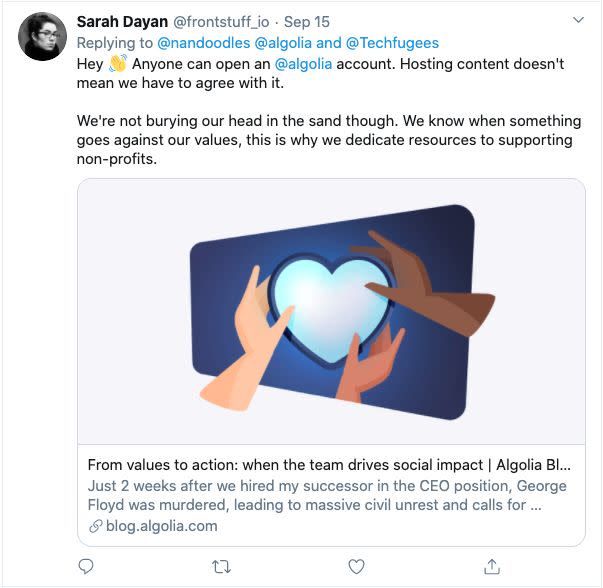A Tech Company Cut Ties With The Trump Campaign Because It Violated Its Values

Last week, a tech analytics company called Hotjar announced the unusual decision to block President Donald Trump and the Republican Party from using its services to promote Trump’s reelection campaign. Hotjar’s logic was remarkably straightforward: The company prides itself on standing against racial injustice, and Trump, with the support of the GOP, has said and done a lot of racist things. Trump and the Republican Party “are clearly not aligned with our values as a company, and in the spirit of living our value of working with respect, we have decided to take action” two Hotjar executives wrote in a post explaining the move.
The Trump campaign was using Hotjar to optimize the user experience in its online merchandise store. Hotjar is the first software company to publicly drop the Trump campaign as a customer, according to Nandini Jammi, a marketing industry advocate who has called on companies to stop working with groups and individuals that promote hate. Most tech companies share (or at least claim to) Hotjar’s progressive values. But few are as ideologically consistent in their actions. Fearful of baseless allegations of anti-conservative bias, tech companies generally try to excuse themself of responsibility for their role in promoting hateful ideologies. They default to claims of objectivity, neutrality and an insistence that no one should want them to be the arbiter of morality. Several tech companies have even been hesitant to cut off services to violent neo-Nazis.
“There is this false assumption that staying on the sidelines is the objective thing to do,” Mohannad Ali, the chief product and technology officer at Hotjar, told HuffPost in an interview. But “to choose not to do something is, in itself, a subjective stance,” he said.
Jammi, who helped convince Hotjar to cut ties with the Trump campaign, has flagged at least four other tech companies who claim to be committed to fighting racial injustice but whose services are supporting the reelection effort of a president who has repeatedly incited violence against anti-racist protesters.
Shopify, an e-commerce company whose chief executive recently described racism as “one of the bleakest aspects of humanity,” helps the Trump campaign sell MAGA hats. The Trade Desk, which claims to be “transforming media for the benefit of humankind,” helps the Trump campaign make targeted ad buys online. Optimizely, a company that recently wrote about its efforts “to stop systemic racial abuse,” is helping the Trump campaign A/B test its messaging. Algolia, a company that promotes its work with mentorship programs for refugees, helps power the search engine for Trump’s list of “accomplishments.” When you type “refugee” into that search engine, the only result that comes up is “Refugee Admissions Hit Lowest Number in 15 Years.”
Ian Colley, The Trade Desk’s vice president of communications, told HuffPost his company’s platform is “neutral and objective.” Shopify, Optimizely, and Algolia did not respond to requests for comment, although an Algolia software engineer defended her company’s conduct in a since-deleted tweet and suggested that donating to nonprofits offsets the harm in working with groups and individuals who are at odds with the company’s values.

“Most tech companies already have policies against hate speech and violence, but they’re reluctant to enforce them,” Jammi told HuffPost. “Tech CEOs still tend to think of their platforms as public utilities, as if they’re just the piping running through a house. I don’t think people are buying that anymore.” Unlike public utilities, a top priority for tech companies is to profit off of the people who use their services, making it harder to claim moral distance. (Hotjar says it plans to donate the approximately $920 it made from the GOP.)
Hotjar’s decision is a testament to the effectiveness of public pressure from people like Jammi, who co-founded Sleeping Giants, a group that uses social media to pressure companies to stop financially supporting the far-right through advertising revenue. Jammi called out Hotjar in August as one of several companies that claims to be anti-racist while helping Trump’s reelection effort. Two weeks later, she posted a message from a Hotjar customer service representative saying the company planned to update its acceptable use policy to prohibit sites promoting hate speech from using its services — but that the change likely would not impact the Trump campaign’s merch store.
“We’re planning to update our policy to include hate speech but we will invent reasons to keep servicing the Trump campaign.” pic.twitter.com/bcR1hsyF12
— Nandini Jammi (@nandoodles) August 31, 2020
Hotjar employees were immediately uncomfortable with that solution, Ali said. After further deliberation and conversations with Jammi, they decided to update the policies to prohibit any sites that promote organizations, platforms, or people that promote hate, a broader description that encompasses the Trump campaign’s merch store.
That Trump is an elected official and part of a mainstream political party made the decision especially tricky, Ali said.
“I feel you’re sort of forced to believe that the line between what is racist or hateful and what is not has become not very clear anymore — some of these things have become all of a sudden debatable,” he said. “And this has translated to an implicit expectation within the industry that the right decision to make is to stay objective, stay on the sideline, accept that there are opposing ideologies or political views that we should respect equally. I think it’s very easy to fall into this trap of false objectivity. We almost actually fell into it ourselves.”
In its statement explaining its decision, Hotjar directly confronted some of the most common reasons its competitors give for allowing inciters of hate to use their products. “You might be wondering if this is considered an attack on freedom of speech,” Ali and CEO David Darmanin wrote. “Our decision to stop working with any customer has no impact on their ability to speak freely or express themselves. When we decide to stop working with a website that violates our Acceptable Use Policy, it is simply a decision to not participate in amplifying a message that contradicts our values.”
Hotjar was “brave to be so transparent about the thought process behind their decision,” Jammi said. “In doing so, they’ve provided the tech industry with a blueprint for how to approach a difficult decision. I wouldn’t be surprised if more companies follow in their footsteps.”
We want to know what you’re hearing on the ground from the candidates. If you get any interesting ― or suspicious! ― campaign mailers, robocalls or hear anything else you think we should know about, email us at scoops@huffpost.com.
Love HuffPost? Become a founding member of HuffPost Plus today.
This article originally appeared on HuffPost and has been updated.

